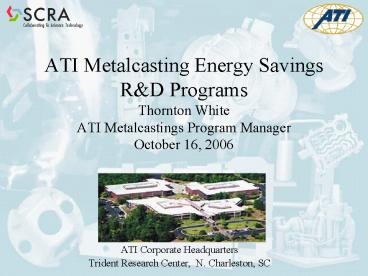ATI Corporate Headquarters - PowerPoint PPT Presentation
1 / 19
Title:
ATI Corporate Headquarters
Description:
18 years of experience building and managing 20 National and International R&D ... Photomicrograph of MMC produced from alloy 13 and 7 micron diameter alumina ... – PowerPoint PPT presentation
Number of Views:74
Avg rating:3.0/5.0
Title: ATI Corporate Headquarters
1
ATI Metalcasting Energy Savings RD
ProgramsThornton WhiteATI Metalcastings Program
ManagerOctober 16, 2006
- ATI Corporate Headquarters
- Trident Research Center, N. Charleston, SC
2
ATI
- 18 years of experience building and managing gt 20
National and International RD Consortia - 501(c)3 Not-for-Profit
- Portfolio of models and processes
- Our experience helps build collaboration
businesses to suit each customers needs - Knowledge of typical barriers and how to
anticipate solve each - Ala Carte selection of sophisticated or simple
elements - User-led structures to keep implementers in the
drivers seat - Proven toolkits for building new RD
collaborations - Responsive, rapid and flexible contracting of RD
portfolios - Government approved accounting systems with
flawless audit record - One-stop full service shopping (legal, PR, etc.)
- Reliable protection of members IP and
proprietary data - Diversified business base across many industries
and federal agencies
3
Program Overview
- Mission of DOE Industrial Technologies Program
- Develop technologies to improve energy
efficiency - Industrial partnerships, technology transfer,
education
E-SMARRT - Seeking maximum energy savings in -
Mold / Core Processes - Melting Processes - Alloy
Families - Finishing Processes
CMC DOE / Industry Associations partnership to
assure effective RD technology transfer
4
Uniqueness of E-SMARRT Project
- A large award of over 11 million (typical range
is 0.5 to 3 million), matching cost share
of over 50 - Bundle of 29 independent projects, many energy
saving avenues - 26 under way - RD work to be performed by 13 organizations,
mostly universities with strong metal casting
programs and two national laboratories - Strong participation of metalcasting industry
- Guidance from American Foundry Society, North
American Die Casting Association and Steel
Founders Society of America - Over 90 companies providing plant facilities,
materials, testing and training as cost share
5
Roles and Responsibilities
- ATI Contract Prime
- Project Management
- Financial and Technical reporting to DOE
- DOE/ITP Sponsor and Monitor
- Approve SOW and budget, Provide funds and
guidance, Monitor progress - Industry Associations (AFS, NADCA, SFSA)
- Coordination with industry (needs, technology
transfer, cost share) - RD Performing Organizations
- Perform work per plan to achieve DOE/Industry
objectives, prepare and submit reports in time - Industry Partners Evaluators and Users
- Provide facilities, materials and services to
develop and test commercialization potential
6
Project Organization Chart
AFS, NADCA SFSA
DOE
ATI
RD Companies
National Laboratories
Universities
Metal Casting Companies
7
13 Foremost MetalcastingRD Organizations
8
93 E-SMARRT IndustryCost Share Partners
Detail Upper Midwest
9
Energy Content U.S. Industry
Source DoE BCS
10
Energy Content Casting Industry
Source GM Powertrain
Source DoE BCS
Energy Savings Casting Applications
11
COMPARATIVE BTUsMetalcasting Process vs-
Metalcasting Application
Castings Impact on Energy Savings
Growing share of lightweight castings in
automotive platforms
2003 (e1) Process Energy Consumption 0.31 Quad
(1015 BTUs)
2003 (e2) Gasoline BTUs Saved 0.63 Quad (1015
BTUs)
1 Based on 1997 DoE data revised for estimated
process energy savings 2 From Lightweight
Castings Improving Fuel Economy in 2003 BCS/US
Dept of Energy
Source DoE BCS
12
RD Areas
- Improve Melt Efficiency
- Innovative Casting Processes for Yield
Improvement / Revert Reduction - Instrumentation and Control Improvement
- Material Properties for Casting or Tooling Design
Improvement
AN INTEGRATED RD PORTFOLIO
13
Improved Melt Efficiency
- Improvements in Efficiency of Melting for Die
Casting - Increasing the energy efficiency of aluminum
melting and handling in die casting operations - Melting Efficiency Improvement
- Develop new melting technologies and processes to
improve the energy efficiency of melting in steel
foundry operations
Example Evaluating energy efficient die casting
equipment
Example Evaluating thermal properties of newly
developed ceramics for steel ladle linings
14
Innovative Casting Processes for Yield
Improvement / Revert Reduction
- Design Support for Tooling Optimization
- Developing optimization thermal management
techniques to aid in the die cooling system
design
Minimizing Tooling Deflection
Improve Gating to Improve Fill
15
Innovative Casting Processes for Yield
Improvement / Revert Reduction
- Manufacturing Advanced Engineered Components
Using Lost Foam Casting Technology - Advance the Lost Foam Casting technologies to
improve production efficiency and mechanical
properties
Cast aluminum engine blocks and heads made
without cores Lighter Cooler
16
Innovative Casting Processes for Yield
Improvement / Revert Reduction
- Simulation of Distortion and Residual Stress
Development During Heat Treatment of Steel
Castings - Develop a model for predicting the distortions
and residual stresses that develop during heat
treatment of steel castings
17
Instrumentation and Control Improvement
- Energy Efficiency Instrumentation
- Improve the manufacturing system at metalcasting
plants through better instrumentation and process
control to reduce energy consumption and waste
Time-temperature profiles to examine the
variability in soak times after ramp completion
for various section sizes in a load.
18
Material Properties for Casting or Tooling
Design Improvement
- The Development of Surface Engineered Coating
Systems for Aluminum Pressure Die Casting Dies
Towards a Smart Die Coating - Development of a range of engineered coating
systems that will substantially extend the life
and performance of dies used in aluminum pressure
die-casting
500 oC
800 oC
1000 oC
1150 oC
ESEM microphotographs of CrAlN (22 Al) film
annealed at different temperatures
19
Material Properties for Casting or Tooling
Design Improvement
- Development of Elevated Temperature Aluminum MMC
Alloy and Process Technology - Develop a production capable cast aluminum Metal
Matrix Composite (MMC) alloy with a high
operating temperature capability
Photomicrograph of MMC produced from alloy 13 and
7 micron diameter alumina































